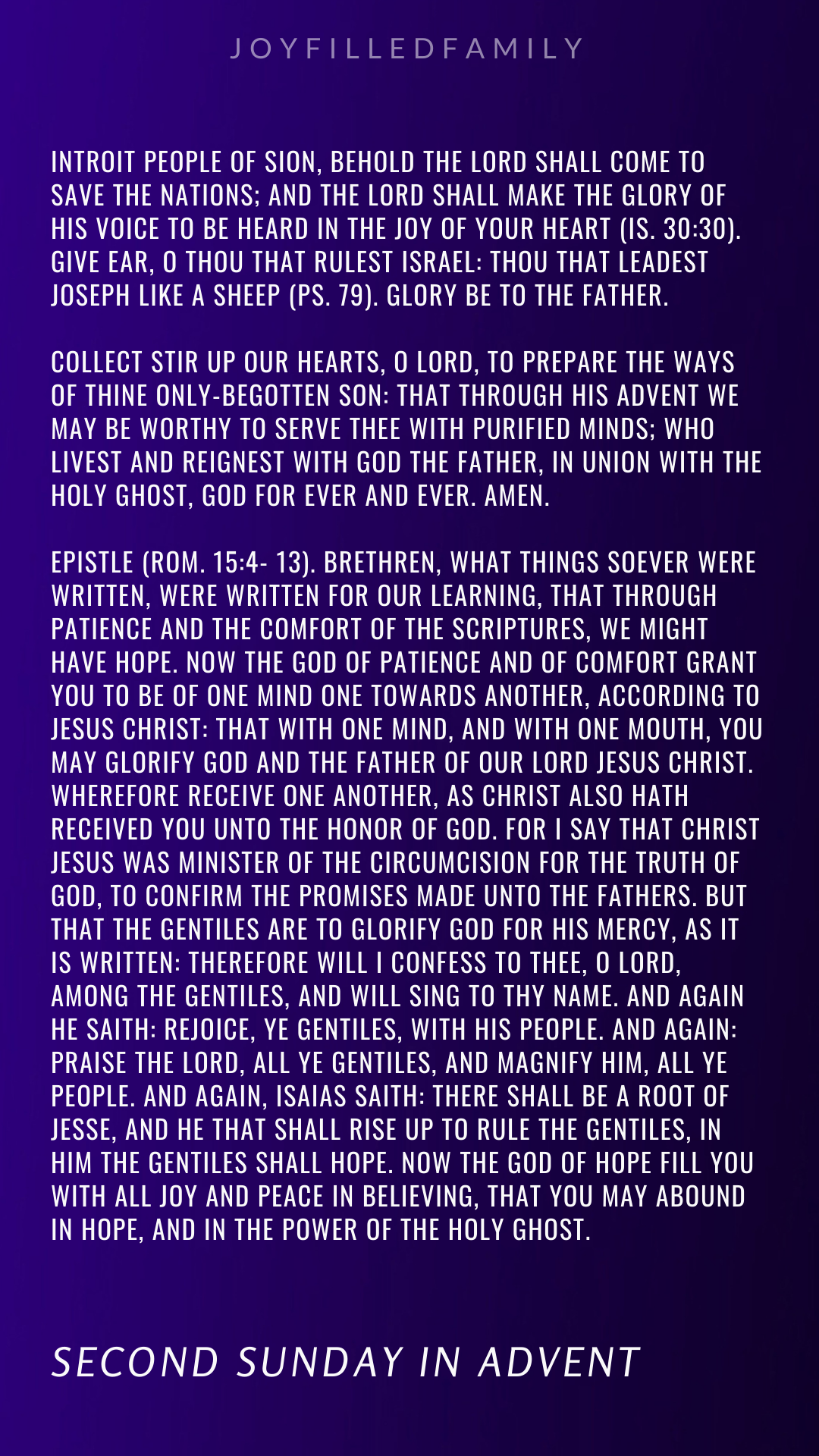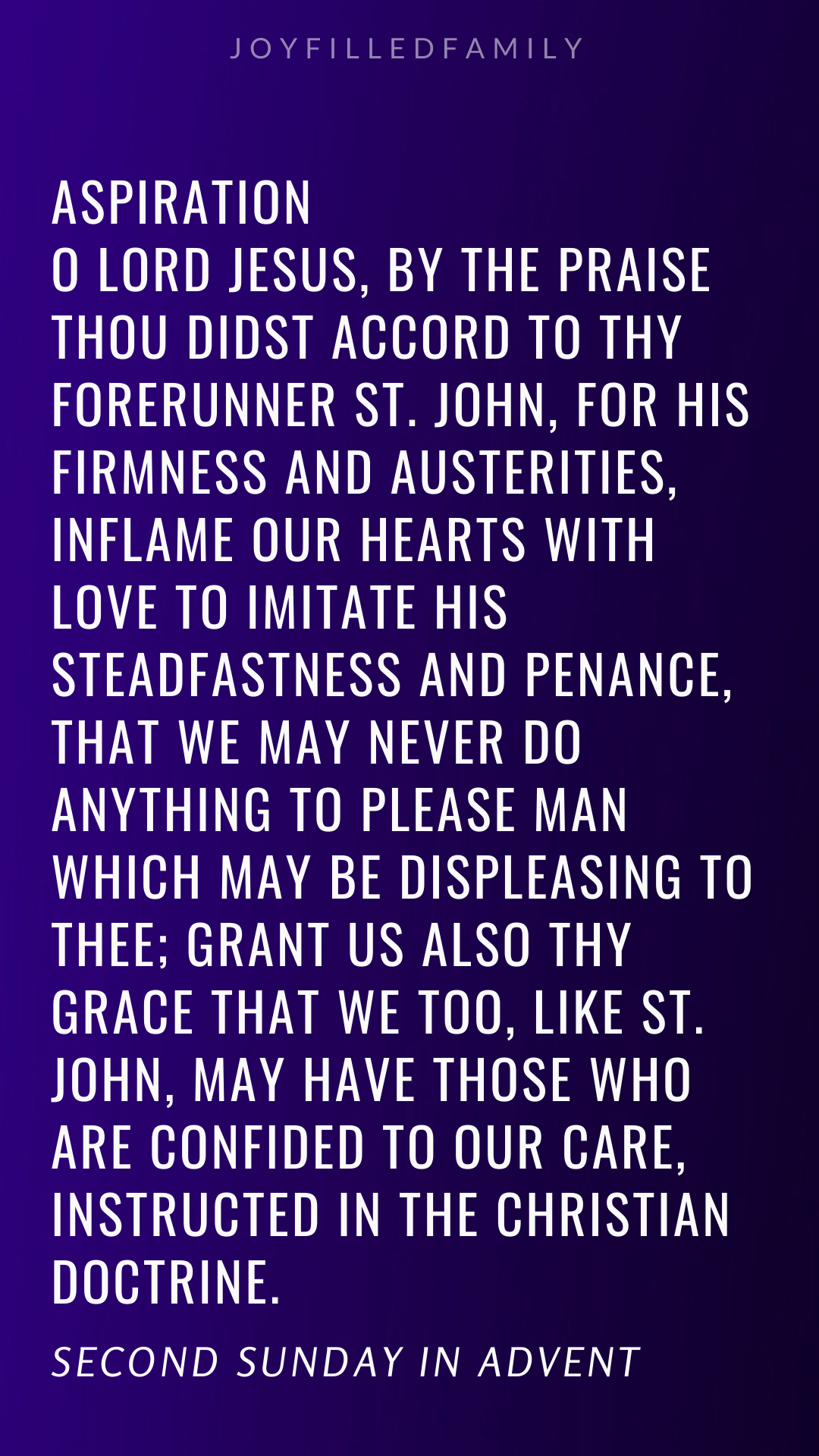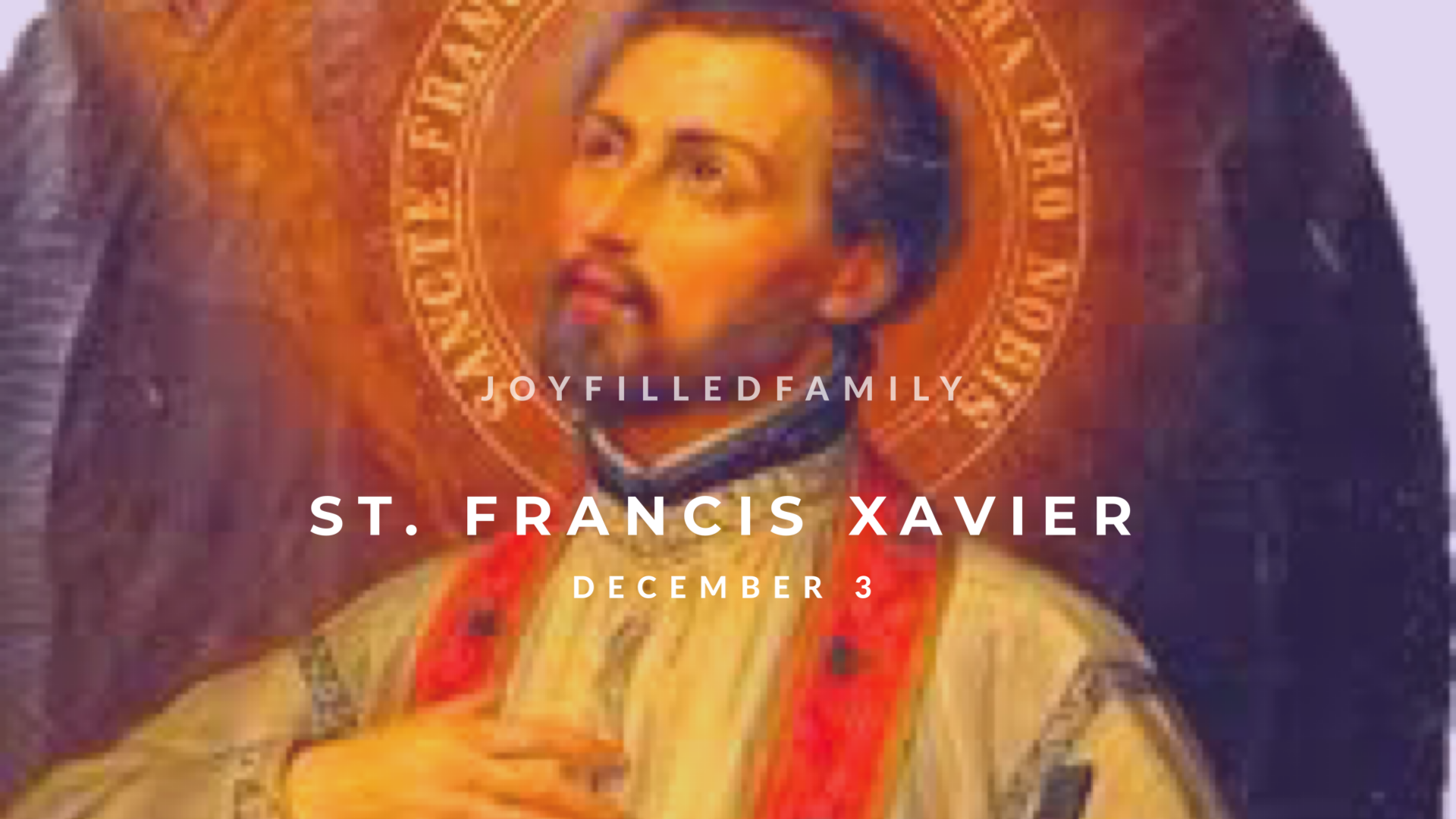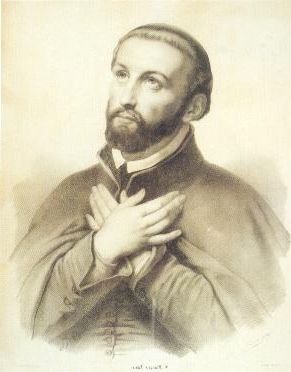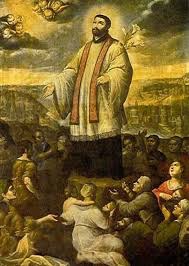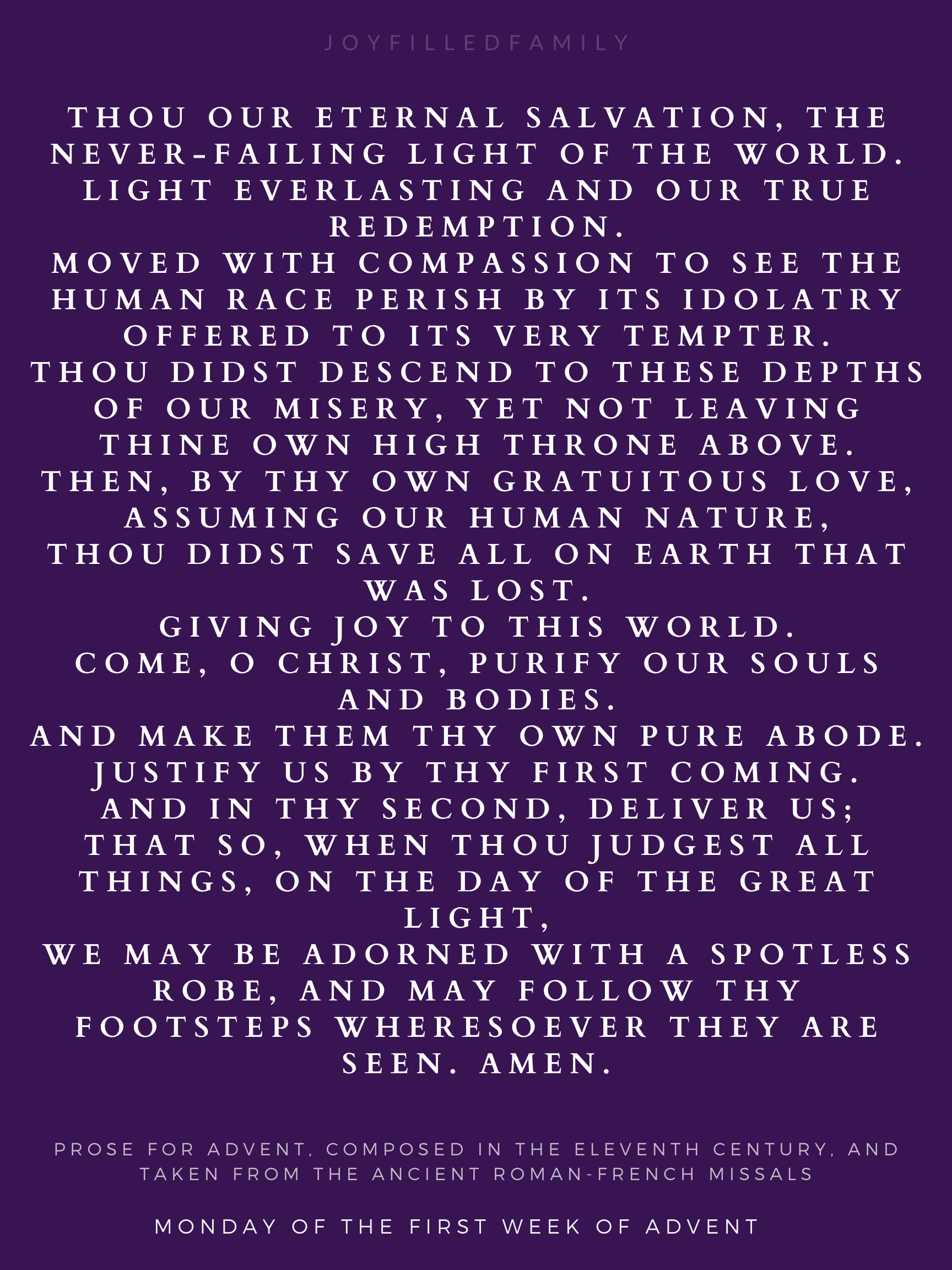O Mary, conceived without sin, pray for us who have recourse to thee!
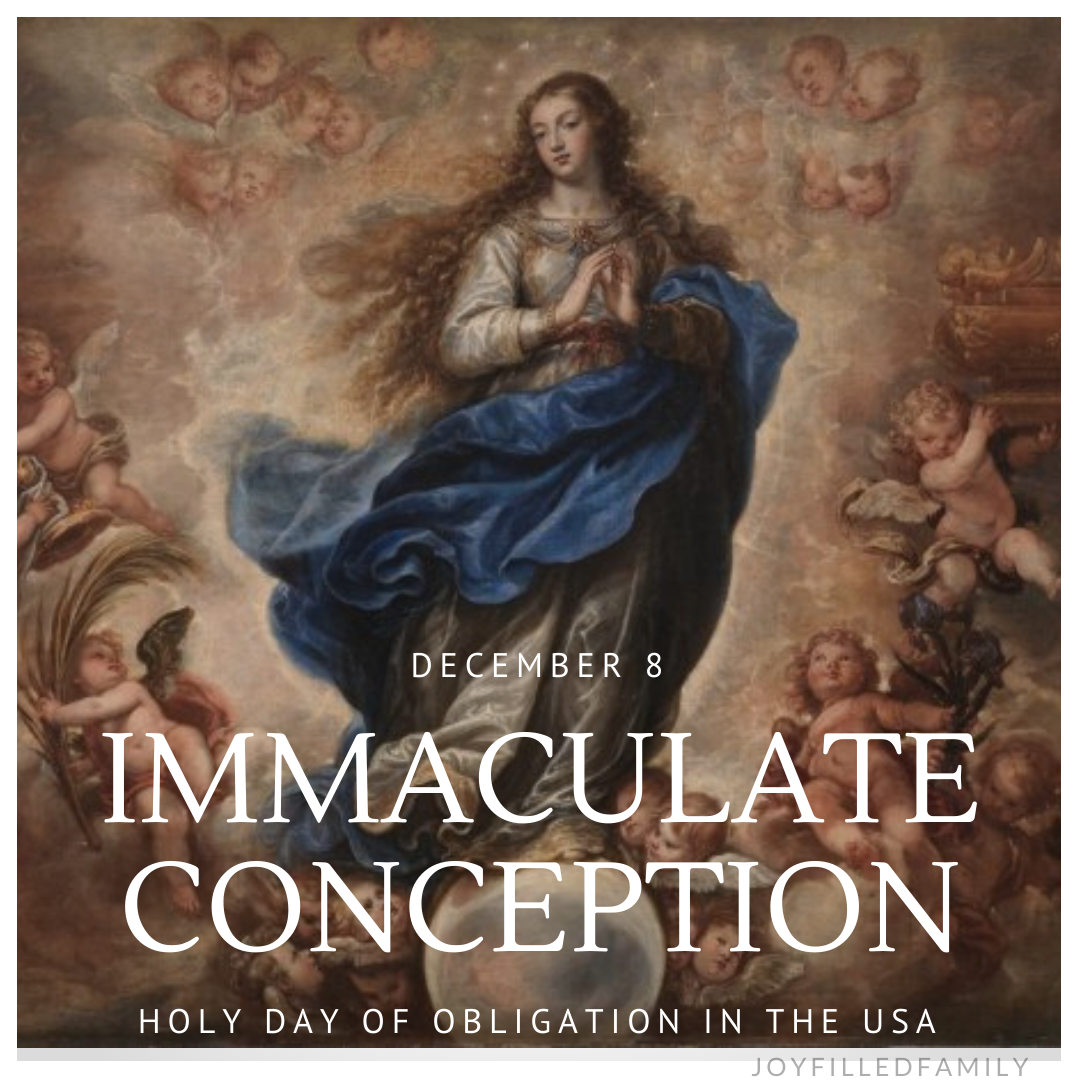
THE FEAST OF THE IMMACULATE CONCEPTION OF THE BLESSED VIRGIN MARY
(Takes precedence over an Advent Sunday)
Fr. Goffine, The Church’s Year
On this day and the ensuing eight days, the Catholic Church celebrates with special solemnity the Immaculate Conception of the Blessed Virgin Mary.
What does the Catholic Church understand by the Immaculate Conception?
By the Immaculate Conception she does not understand that great grace by which Mary preserved herself pure from every, even the least, actual sin; for, as concerns this, the Church has long since declared that Mary never sinned: nor does she understand by it her continual virginity, for it has been for a long time a doctrine of faith that both before and after the birth of her divine Son Mary remained a pure virgin; nor yet that she was sanctified before birth,; as were the Prophets Jeremias and John the Baptist, who were both conceived in sin, but by a special grace of God were released from it before their birth; neither does she understand by it the conception of Christ from the Holy Ghost, that is, that Mary unstained conceived the Son of God of the Holy Ghost; and without the assistance of man, for this was always the unalterable doctrine of the Church: she does understand by it that exalted favor, that unshared privilege, by which the Blessed Virgin Mary, in the first moments of her conception, by a special grace and favor on the part of God in reference to the merits of Jesus, our Saviour, was preserved from every stain of original sin.
What has until now been held by the Church in regard to this privilege?
Adam and Eve are banished from the Garden of EdenThe Catholic Church has always been of the pious opinion that Mary, the blessed Mother of the Redeemer, was conceived immaculate, that her most pure soul had never from the first moment of her existence the least shadow of sin. This doctrine was embraced by all the saints, the most learned and most faithful children of the Church. We have testimony of this, as far back as the times of the apostles, in a document concerning the sufferings of St. Andrew, in which it is said: “As the first man was created from the spotless earth, so was it necessary that the perfect man (Christ Jesus) should be born of an immaculate virgin.” St. Justin, who died a martyr in the year 167 after Christ, compares the Blessed Virgin to Eve, before she sinned and while she was still a virgin. St. Amphilochus says: “He who created the first Eve free from shame, created the second without spot or stain.” Origen, one of the Fathers of the Church, writes that she was neither surprised by the personated serpent, nor infected by his poison, and calls her a pure and immaculate mother. St. Ephrem calls her the undefiled, the strong, the inviolate, the most chaste virgin, far removed from all spot and stain. The Abbot St. Sabbas says of Mary: “On thee who never took part in any guile, I place my hope. No one but thou, O Lady, is without fault, and besides thee no one is unsullied and spotless.” St. Ambrose calls Mary a virgin who by the grace of God remained always free from all shadow of sin. St. Augustine says: “When there is mention made of sin, the Virgin of whom on account of our Lord no question is to be asked, must be excepted.” St. Proclus says, “that the holy Mother of God was made by the purest God free from all stain.” St. Fulgentius says: “The wife of the first man was led astray and her soul soiled toy the malice of sin, but in the mother of the second (Christ) the grace of God preserved the soul as well as the body inviolate.” St. Paschasius Radbertus testifies: “It is certain that Mary was free from original sin;” and St. Peter Barman says: “The flesh of the Virgin taken from Adam, would not submit to the stain of Adam,” and before him the pious Doctor Alcuin wrote of Mary: “Thou art beautiful as the moon and free from all spot and every shadow of changeableness!” And St. Ildephonsus says: “It is certain that Mary was free from original sin.” An immense number of saintly men and theologians maintained the same. Many of them argued with the greatest keenness and the most indefatigable zeal the part of the Blessed Virgin; the teachers at the universities of Paris, Salamanca, Coimbra, Naples, Cologne, Mayence, Ingolstadt, &c., made it their duty by vows to inculcate this great privilege of the most favored Virgin, and to defend it by speech and by writings. Celebrated orders of monks, especially the orders of St. Benedict, St. Francis and St. Ignatius, made it their duty to advance this pious faith of the Immaculate Conception among the people. A great number of popes and bishops also honored the Immaculate Conception, and forbade the contrary doctrine to be taught. Even kings, princes and emperors counted it a great honor to pay homage to the Immaculate Conception of the Queen of Heaven. Finally, the Catholic Church gave definite expression to this universal belief, by declaring in the Council of Trent, that in the resolutions relating to original sin, the Virgin Mary was not included, and she confirmed the festival of the Immaculate Conception, introduced in the tenth century by St. Anselm, the worthy son of the great St. Benedict, and since that time observed in all the Churches.
This veneration for the Immaculate Conception, this pious view held by the whole Catholic Church was not yet a matter of faith, that is, the Catholic Church had not yet laid down this great privilege of the Mother of God as a dogma. We were not commanded to believe it, although to preach or teach against it was forbidden. But when, in the course of time, a large number of the faithful, among whom were archbishops, bishops, whole religious orders, as well as great monarchs, besought the pope as head of the Church to pronounce concerning the Immaculate Conception of the Blessed Virgin, that is, to elevate the belief so widely spread throughout the Catholic Church to a dogma, the pope could no longer hesitate to raise his voice in regard to this most important affair.
What did the supreme pastor of the Church, the pope, then do in regard to the Immaculate Conception of the Blessed Virgin?
Pope Pius IX. who, as he himself testified, had in many ways experienced the assistance of the great Queen of Heaven, was urged by his love and childlike veneration for the Blessed Mother of our Lord, to set the last brilliant diamond in her crown of glory by declaring the Immaculate Conception an article of faith. Not wishing to be precipitate, he first addressed a circular to all the primates, patriarchs, archbishops and bishops, of the whole Catholic world, February 2, 1849, requesting them to send him reports of the devotion of their clergy and the faithful concerning the Immaculate Conception, and the extent of their desire in the matter, that the case might be decided by the Apostolic See; at the same time he urged them to pray with him that God would give him the necessary enlightenment, and to call upon the clergy and the faithful for their prayers. When this was done, five hundred bishops in different parts of the world declared that they and their flocks firmly believed that Mary, the most favored Virgin, was preserved from every stain of original sin, and that they earnestly desired that the pope might raise this pious opinion to a dogma of the Church. Then the holy father, filled with delight, invited the bishops of the different countries to Rome, to consult with him upon the matter. About one hundred and fifty bishops, and a large number of learned men and superiors of spiritual orders, met at Rome and the whole subject was once more maturely examined; and at last, the 8th of December, 1854, the day on which the Church celebrates the feast of the Immaculate Conception, was appointed as the day on which the pope, the supreme head of the Church, the mouth of the apostles, should solemnly announce the dogma of the Immaculate Conception.
On this day the holy father ascended the Apostolic Chair in the splendid Church of St. Peter at Rome, and surrounded by the assembled cardinals, archbishops, and bishops, the clergy and the people he once more invoked the light of the Holy Ghost, and amid the perfect silence which reigned in that immense church, the holy father in a loud voice and with the most profound reverence and emotion read the decree by which he solemnly pronounced and established, that:
“It is an article of faith that the Blessed Virgin Mary by a special grace and privilege of God, on account of the merits of Jesus Christ, the Redeemer of mankind, was from the first instant of her conception protected and preserved from every stain of original sin.”
Thus has the head of Catholic Christianity drawn aside the veil, which until then obscured the full glory of the Queen of Heaven, which now shines in stainless loveliness radiant over the whole world. The truth that the Blessed Virgin Mary was conceived immaculate is no longer a pious opinion, but an article of faith which every Catholic who wishes to remain a child of the Church, must profess with heart and with lips.
But, perhaps the decision of the pope concerning the Immaculate Conception is a new doctrine?
By no means; it is an old belief, established upon the holy Scriptures and laid down in the bosom of the Church, but not solemnly pronounced and made public previously. The pope cannot make a new article of faith, but he can and must announce that, as a revealed truth, which is established by the holy Scriptures and has been everywhere and at all times believed as a revealed truth by all true Christians. But if there is a truth founded on the holy Scriptures and tradition, of which the pope, the representative of Christ on earth, speaks officially, then every Catholic is bound to believe and openly to acknowledge the same. As we have already seen, the doctrine of the Immaculate Conception has been believed since the time of the apostles, and it is also established by the Scriptures. In the oldest of the sacred Books, in the Book of Genesis, (iii. 15.) is one of the most weighty passages on this subject which reads: I will put enmities between thee and the woman, and thy seed and her seed; she shall crush thy head, and thou shalt lie in wait for her heel. After the fall of the first man, God spoke to the serpent, Satan, announcing that a woman would come and crush his head, that is, destroy his power; and all Catholic interpreters and holy Fathers agree that this woman is the Blessed Virgin. Mary is, therefore, placed by God Himself as Satan’s enemy, and must have been free from original sin from the first moment of her conception, otherwise she would have been, as St. Paul, the Apostle, says, a child of God’s wrath and under the power of Satan. In the gospel of St. Luke, (i. 28.) it is further said: And the Angel being come in, said unto her: Hail full of grace: the Lord is with thee: blessed art thou amongst women. The angel, by the direction of God, called Mary full of grace, that is, more than any of the just endowed with God’s sanctifying grace, as the holy Fathers agree. But would Mary be full of sanctifying and all other graces, had she for one moment of her life been without grace and burdened with sin? Would God have permitted the Blessed Mother of His only begotten Son, from whom He received flesh, to be touched by sin, even though for an instant, and be in the power of Satan? No; God’s hand preserved her; by His grace and by the infinite merits of her divine Son she remained free from every stain of sin, and the Church most justly applies to her the words of holy Scripture: Thou art all fair, O my love, and there is not a spot in thee. (Cant. iv. 7.)
What instructive meaning has the Immaculate Conception of the Blessed Virgin for every Catholic?
The Immaculate Conception teaches Catholics to know in some measure the infinite sanctity of the holy Trinity which makes sin so hateful and detestable to Him. The Heavenly Father could not see His beloved daughter for one moment stained by sin. The Divine Son could not wish to choose for His mother a virgin upon whose soul there was a vestige of sin. The Holy Ghost whose most pure bride Mary is, was not willing that her heart, His dwelling-place, should ever be for one instant soiled by sin. Behold how God detests sin! The Immaculate Conception also teaches us the inestimable treasure of sanctifying grace. Mary received this priceless treasure from God even in the first moment of her conception, without it she would never have become the Mother of the Saviour. Thou, my Christian, hadst not this treasure at thy conception, it is true, but thou didst receive it in holy baptism; there God’s hand arrayed thee in the white garment of innocence; there He sanctified thy soul, and the Holy Ghost selected it for His dwelling-place. Mary preserved this inestimable treasure until death, she was always blooming as a pure lily, the breath of sin never soiled her loveliness. Ask thyself: Do I still possess this treasure, which was given to me in holy baptism; have I preserved my soul’s beauty from the poison of sin, have I soiled it, destroyed it, lost it? Oh, if thou hast lost this precious gift, how unhappy art thou! if thou hast had this great misfortune to have stained thy garment of baptismal innocence by sin, Mary, the peerless virgin, has borne for thee the Saviour whose precious blood cleanses from every sin, whose infinite merits will restore to thee sanctifying grace, if thou art contrite and dost confess thy sin. But for the Saviour this treasure would be forever lost to thee, and thy soul forever forfeited. But for this Saviour Mary would not have been preserved from original sin, would not have received sanctifying grace at her conception. We can here learn the necessity of salvation through Christ, gratefully thank God who has given it to us, and praise Mary who had the grace to conceive and give birth to Him. In the Immaculate Conception, O Christian, thou canst learn to know something of the priceless value of virginity. Jesus chose a pure and immaculate virgin for His mother, who should be the mirror of all virginal souls, her most pure and immaculate image should be continually presented to the corrupted world to show how virginity is esteemed in the eyes of our Lord.
INTROIT I will greatly rejoice in the Lord, and my soul shall be joyful in my God: for He hath clothed me with the garments of salvation: and with the robe of justice He hath covered me, as a bride adorned with her jewels. (Isai. Ixi. 10.) I will extol Thee, O Lord, for Thou hast upheld me: and hast not made my Enemies to rejoice over me. f/fr.xxix.) Glory etc.
COLLECT O God, who by the Immaculate Conception of the Virgin, didst prepare a worthy habitation for Thy Son: we beseech Thee, that as Thou didst through the foreseen death of Thy same Son, preserve her from all stain, so Thou wilt also grant that we may reach Thee cleansed through her intercession. Through the same Jesus etc.
LESSON (Prov. viii. 22—35.) The Lord possessed me in the beginning of his ways, before he made any thing, from the beginning. I was set up from eternity, and of old, before the earth was made. The depths were not as yet, and I was already conceived: neither had the fountains of waters as yet sprung out: the mountains with their huge bulk had not as yet been established: before the hills I was brought forth: he had not yet made the earth, nor the rivers, nor the poles of the world. When he prepared the heavens, I was present; when, with a certain law and compass, he enclosed the depths; when he established the sky above, and poised the fountains of waters; when he compassed the sea with its bounds, and set a law to the waters, that they should not pass their limits; when he balanced the foundations of the earth. I was with him, forming all things, and was delighted every day, playing before him at all times, playing in the world; and my delights were to be with the children of men. Now, therefore, ye children, hear me: Blessed are they that keep my ways. Hear instruction, and be wise, and refuse it not. Blessed is the man that heareth me, and that watcheth daily at my gates, and waiteth at the posts of my door. He that shall find me shall find life, and shall have salvation from the Lord.
EXPLANATION AND APPLICATION This lesson is first a panegyric on the divine, uncreated Wisdom, the eternal Son of God, who at all times and before all things was with God and in God, by whom was made everything that was made, ordered and preserved; who rejoices in His works, loves them, and who admonishes man to love and imitate Him, and promises him eternal and temporal happiness. The Church causes this lesson to be read on this day, because the greater part of it can be applied to Mary; for it can truly be said of her, that she, as the most holy and excellent of all creatures, possessed the first place in the heart of God. For this reason the Church applies to her the words of the wise man: I came out of the mouth of the most High, the first-born before all creatures. (Ecclus. xxiv. 5.) For, as St. Richard says, she is the most worthy of all; no one has received so full a measure of purity, and of all supernatural gifts; in no creature are the marvels of divine goodness so visible as in her. Admire, devout soul, this master-piece of Almighty God, and make frequent use of the words of St. Chrysostom:
“Hail Mother of God and our Mother! Hail O Heaven in which God Himself dwells! O Throne of grace from which the Lord distributes His graces! Pray always to Jesus for us, that on the Day of Judgment we may receive forgiveness and eternal salvation.”
GOSPEL. (Luke i. 26—28.) at that time, The angel Gabriel was sent from God into a city of Galilee, called Nazareth, to a virgin espoused to a man whose name was Joseph, of the house of David, and the virgin’s name was Mary. And the Angel being come in, said unto her: Hail, full of grace, the Lord is with thee; blessed art thou amongst women.
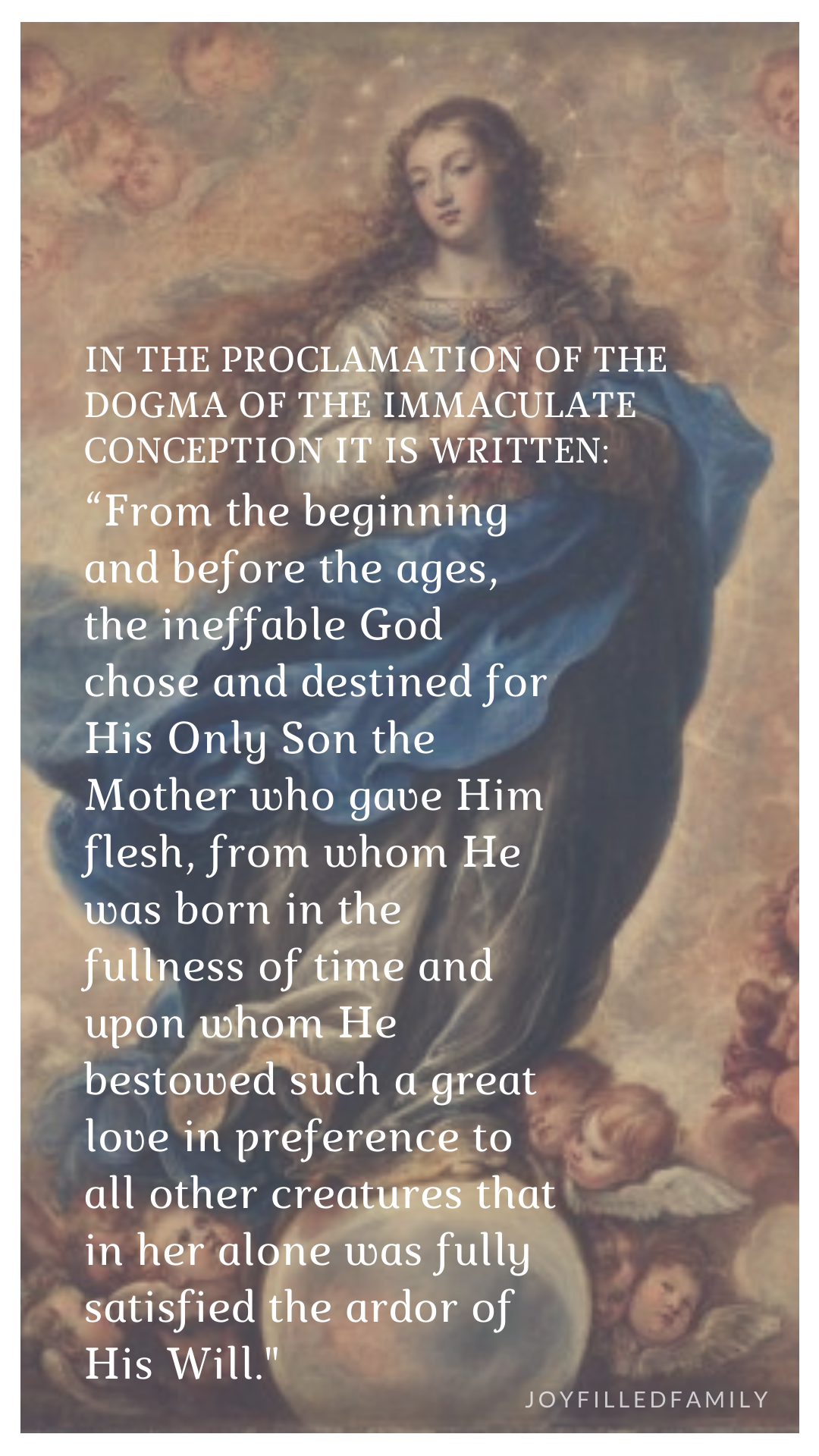
Why is this gospel read today?
Because it has a significant relation to the Immaculate Conception, and proclaims the great honor shown to the Blessed Virgin by these words: Hail, full of grace, the Lord is with thee; blessed art thou amongst women.
Why did the angel call Mary full of grace?
Because Mary was filled with grace, even before she came into this world; because she always increased in grace; because she was to bear the Author of all grace; that we may consider how Mary obtains for us the treasures of divine grace.
Mary was filled with grace even before her birth. As we are all conceived in sin, being children of a sinful ancestor, we are, therefore, burdened by sin before our birth. Mary was free by the privilege of the Immaculate Conception from all sin; her soul, pure and adorned with sanctifying grace, came forth from the hands of the Creator, and without the least prejudice to its purity and sanctity was united to her most pure body, from which the Saviour was to take His humanity. She could not from the first instant of her existence be wanting in that original sanctity and justice, which were the most beautiful adornments of our natural ancestress, Eve.
But Mary from the first moment of her conception was not only in grace but full of grace, because God appointed her for the highest dignity, of being the Mother of His only-begotten Son, and had consequently endowed her with the full measure of corresponding plenitude of graces and gifts of the Holy Ghost; according to the opinion of many learned men, the measure of grace which the Blessed Virgin received at her Immaculate Conception, was greater than that which all the angels and blessed possess now in glory. Mary ever increased in grace: But the path of the just, as a shining light, goeth forward and increaseth even to perfect day. (Prov. iv. 18.) These words of the Holy Ghost are verified especially in the life of the Blessed Virgin. What abundance of grace did she not receive, when the Holy Ghost overshadowed her, and the divine Son, who is Himself the infinite plenitude of grace, was conceived in her most pure body! Above all this, there yet came that rich supply of grace by which her zealous, constant, perfect and faithful cooperation made Mary increase every moment in grace. Thus St. Bonaventure says: “As all the waters meet in the sea, so all the graces were united in Mary.”
Why did the angel say to Mary: The Lord is with thee?
Because God is with the Blessed Virgin in an extraordinary manner. It is well to notice particularly, that the archangel Gabriel did not say to Mary as the angel did to Gideon: The Lord be with thee, (Judges vi. 12.) but: The Lord is with thee. These words are not, therefore, the wish that the favor, the blessing, the protection of God may be with Mary, but the positive declaration that the Lord really is with her, not simply because of His omnipotence and omnipresence by which He is with all His creatures, nor merely because of His goodness, love and intimacy by which He is with all the just. He is with her in a peculiar manner, since she by her dignity of being the Mother of God came into such close relationship with the Triune God that our intellect can conceive nothing nearer. She became the chosen Mother of the Son of God, the dearest, the most favored daughter of the Heavenly Father, and the pure, beloved bride of the Holy Ghost. “God the Father was with her,” says St. Bonaventure, “as with His most noble Daughter; God the Son was with her as with His most worthy Mother; God the Holy Ghost was with her as with His most pure Bride.”
Why did the angel say to Mary: Blessed art thou amongst women?
Because he desired to honor her as the most blessed of her sex, since she alone was chosen of all the others to be the Mother of God; because the first woman brought the curse, but Mary, the salvation of the world.
Mary, Mother of God! An honor, indeed, which in its exaltation is second only to divinity. Mary, the Virgin Mother of God! Mother and Virgin at the same time, what a wonderful prerogative! Though the greatest and most glorious of all mothers, she is the purest and most spotless of virgins, the queen of virgins.
But not only on account of her double glory as Mother of God and as a Virgin, Mary is the most blessed of her sex, but because it was given to her to mediate for us and for the whole world. She is that woman, promised to our first and sinful parents in Paradise, who would crush the serpent’s head; she gave to her Son the body with which He, by His death on the cross, accomplished the great work of salvation.
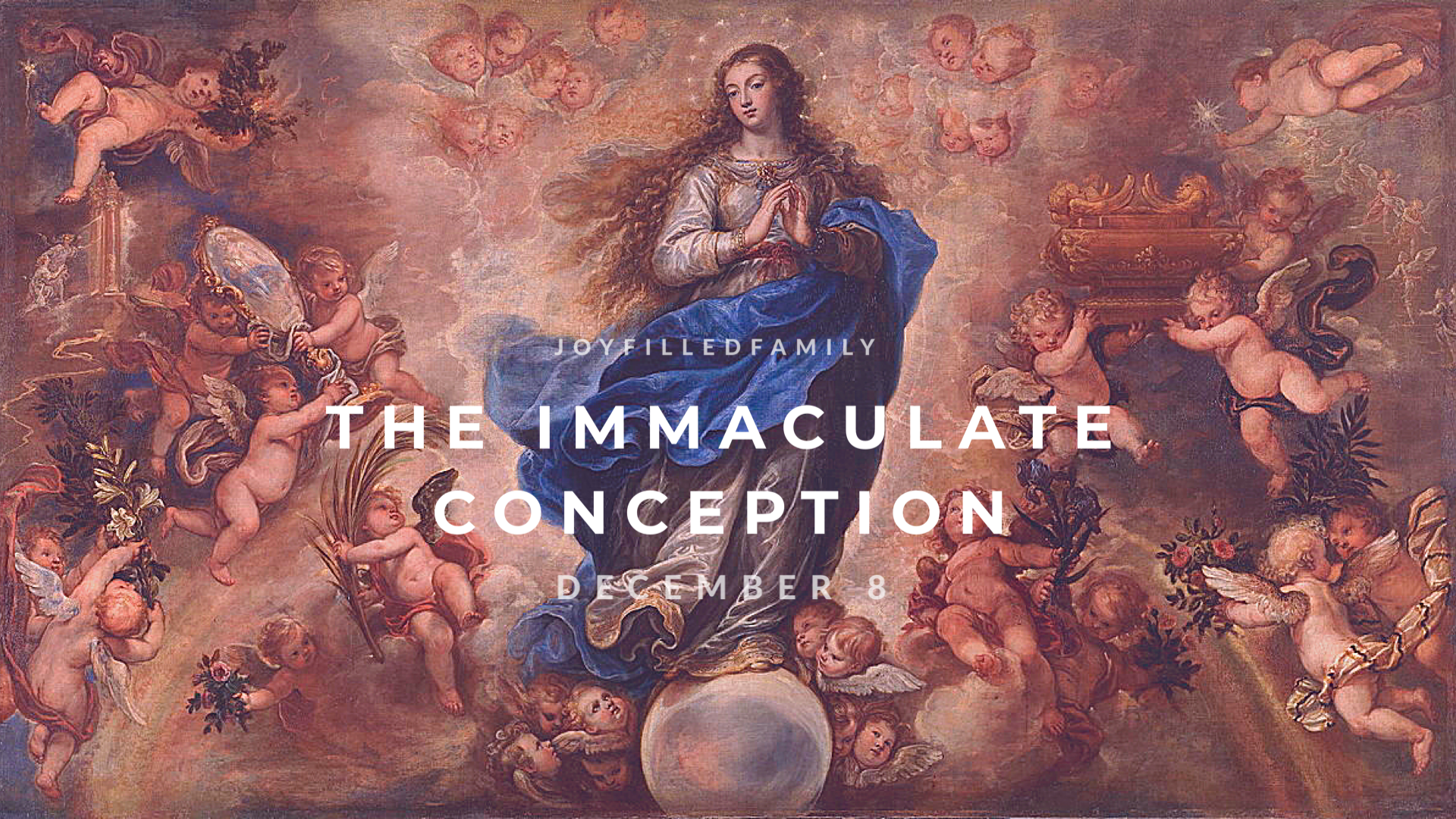
ACT OF PRAISE “Praised and blessed be the holy and Immaculate Conception of the Blessed Virgin Mary!”
(Pope Pius VI. granted an indulgence of one hundred days to those who, with contrition and devotion repeat the above act of praise.)

